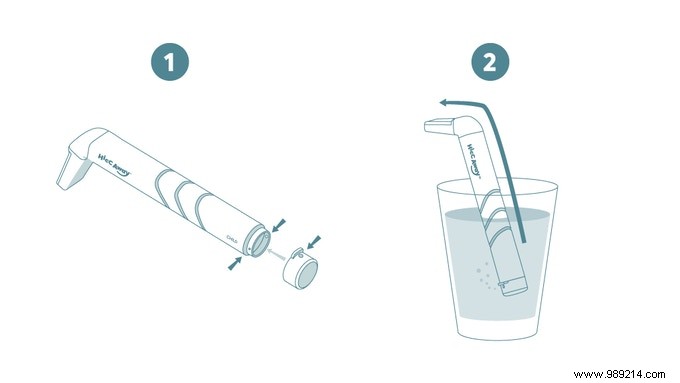In the United States, a neurologist has developed a special straw whose promises can make you smile at first sight. Indeed, the scientist claims that his invention can stop hiccups better than any remedy or trick that many people apply in normal times.
Hiccups are a ventilatory reflex occurring as a result of stimulation of the esophagus (or stomach). This stimulation causes the brainstem to send signals to the diaphragm and other respiratory muscles, causing them to contract violently. The individual is then subject to sudden air intakes and contractions in the vocal cords. These cause the famous "hiccup" characteristic of hiccups.
To overcome this unpleasant reflex , different techniques exist, but no one knows if these really work. Examples include holding your breath for a moment, placing a bag of ice cubes on your diaphragm, or letting a spoonful of sugar melt on your tongue. Other tricks involve drinking upside down, swallowing seven sips of water, or sucking on a lemon.
A study published in the journal JAMA Network Open June 18, 2021 tested a special item on 249 volunteers worldwide. It is a straw called HiccAway developed by neurologist Afi Seifi from the University of Texas at Sans Antonio (USA). The study materializes a crowdfunding campaign on the Kickstarter platform having reached its objectives at the end of 2020.
Afi Seif wanted to opt for a simple solution stimulating both the vagus nerve and the phrenic nerve to stop the hiccups. Concretely, the HiccAway straw has a pressure valve at one end. It therefore has the particularity of forcing the user to suck harder than in the case of a conventional straw. The pressure causes a contraction of the diaphragm and thus stops the uncontrollable influx of air causing the vocal cords to vibrate. On the use side, nothing complicated:the user must immerse the straw in a half-full glass of water and start vacuuming.

According to the results of the study that tested this product, 90% of volunteers found greater improvement than other common remedies and tips. However, this work should be considered with caution insofar as the tests did not include any placebo group. In other words, knowing if the HiccAway straw really works depends on the positive conclusions of future randomized studies including a placebo.
Finally, this work seems really necessary, especially since a study published in 2015 concluded that there was not enough evidence to make reliable recommendations for remedies for hiccups. Nevertheless, Afi Seif already claims that his straw is effective, safe and reliable and embodies the best way to get rid of hiccups.